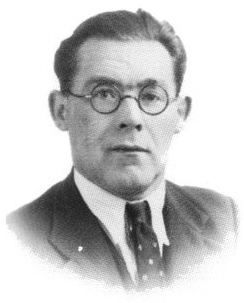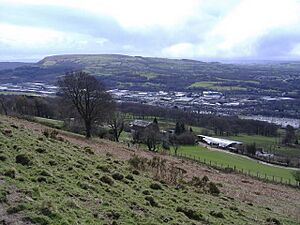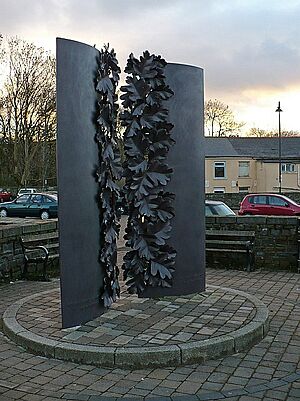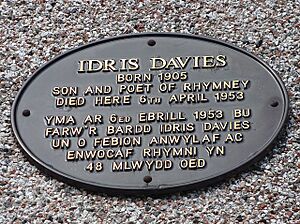Idris Davies facts for kids
Quick facts for kids
Idris Davies
|
|
|---|---|
 |
|
| Born | 6 January 1905 Rhymney, near Merthyr Tydfil, South Wales
|
| Died | 6 April 1953 (aged 48) Rhymney, near Merthyr Tydfil, South Wales
|
| Occupation | Poet |
Idris Davies (born January 6, 1905 – died April 6, 1953) was a famous Welsh poet. He was born in Rhymney, a town in South Wales, near Merthyr Tydfil. He started writing poems in Welsh, but later wrote only in English.
He was special because he wrote about important events in the early 1900s in the South Wales Valleys. He wrote from the point of view of someone who worked in the coal mines. He is most famous for his poem "Bells of Rhymney." This poem was part of his 1938 book called Gwalia Deserta, which means "Wasteland of Wales." Later, this poem was turned into a popular folk song.
Contents
Life and His Journey

Idris Davies was born at 16 Field Street in Rhymney. His family spoke Welsh. His father, Evan Davies, worked as a chief winderman at a colliery, which means he operated the lifts in the mine. Idris learned English when he went to school.
When he was 14, Idris left school. For the next seven years, he worked underground as a miner. He worked in the McLaren Pit and later the Maerdy Pit. One day, he had an accident and lost a finger. After the General Strike of 1926, the mine closed, and he lost his job.
Idris spent the next four years teaching himself. A fellow miner introduced him to the poems of Shelley. This inspired Idris to learn more.
He went to Loughborough College and the University of Nottingham. In 1932, he became a qualified teacher. He started teaching in London, including East London. During this time, he became friends with another famous Welsh writer, Dylan Thomas. He also met other Welsh writers at Griff's Bookshop in London.
Before his first book came out in 1938, Idris's poems appeared in newspapers like the Western Mail and the Daily Herald.
In 1947, he moved back to the Rhymney Valley to teach. His second book of poems, published in 1945, was chosen by the famous poet T. S. Eliot. Eliot believed Idris's poems were very important. He said they were "the best poetic document I know about a particular epoch in a particular place." This means Eliot thought Idris's poems perfectly captured a specific time and place.
His last book, Selected Poems, was published just before he passed away. Dylan Thomas once wrote to Idris about his poem "Bells of Rhymney." Thomas had read it on the radio but felt it wasn't "angry enough" to truly show Idris's style.
His Passing and What He Left Behind

Idris Davies died from cancer when he was 48 years old. He passed away at his mother's house in Rhymney on April 6, 1953. He was buried in the Rhymney Public Cemetery. There are special plaques in Rhymney that remember him.
After he died, over 200 of his handwritten poems and a short play were given to the National Library of Wales. They also found his detailed diaries from wartime. Later, more of his poems and writings were found, including an unfinished novel. Some of these were published after his death in books like The Collected Poems of Idris Davies (1972).
There is a modern statue in Rhymney that honors Idris Davies. It has a line from his poem "Rhymney" carved into it: "When April came to Rhymney with shower and sun and shower."
In 2006, his grave memorial was updated and a special service was held to remember him.
His Ideas and Beliefs
Idris Davies was a socialist. This means he believed that everyone should have a fair chance at a good life. He wanted to see more beauty in everyday life. He also believed that poetry should be true and not just used for propaganda.
He once wrote in his diary: "I am a socialist. That is why I want as much beauty as possible in our everyday lives... Too many 'poets of the Left'... are badly in need of instruction as to the difference between poetry and propaganda." He felt that poets should focus on true art, not just political messages.
His Published Works
Idris Davies's first book was Gwalia Deserta, published in 1938. The poems in this book were inspired by sad events like mining disasters and the effects of the 1926 General Strike and the Great Depression in the United Kingdom on the South Wales valleys.
The "Bells of Rhymney" poem is perhaps his most famous work. It is Part XV of Gwalia Deserta. The poem's rhythm is like the well-known nursery rhyme "Oranges and Lemons."
In the late 1950s, the musician Pete Seeger turned "Bells of Rhymney" into a folk song. It became a popular folk rock song and has been sung by many other artists. More recently, the Welsh performer Max Boyce set other parts of Gwalia Deserta to music in his song "When We Walked to Merthyr Tydfil in the Moonlight Long Ago."
In 2017, the band Public Service Broadcasting included a musical version of a poem from Gwalia Deserta on their album Every Valley. It was sung by Manic Street Preachers' singer James Dean Bradfield.
Books Published During His Lifetime
- Gwalia Deserta (1938)
- The Angry Summer: A Poem of 1926 (1943)
- Tonypandy and other poems (1945)
- Selected Poems (1953)
Books Published After His Death
- The Collected Poems of Idris Davies (1972)
- Idris Davies (1972)
- Argo Record No. ZPL.1181: Idris Davies (1972)
See also
- Anglo-Welsh poetry
 | Chris Smalls |
 | Fred Hampton |
 | Ralph Abernathy |


